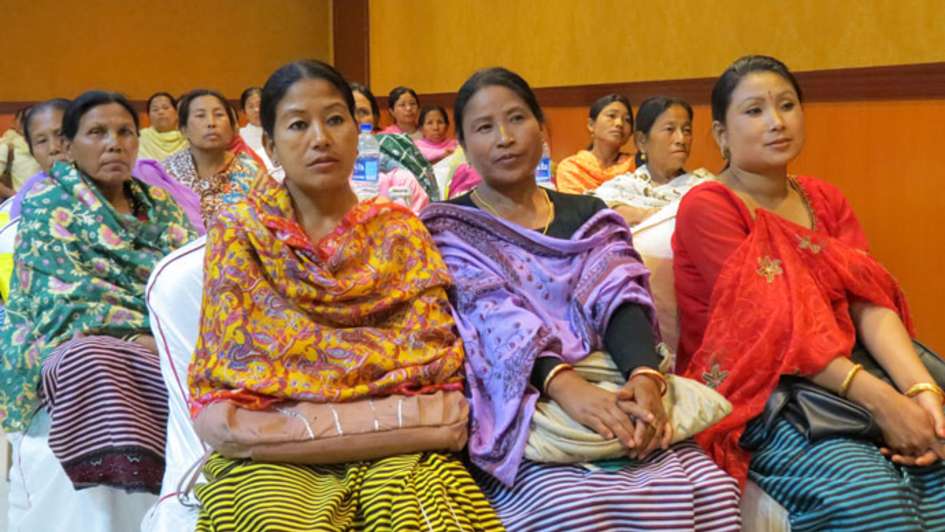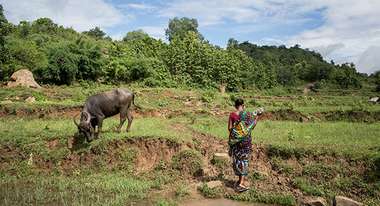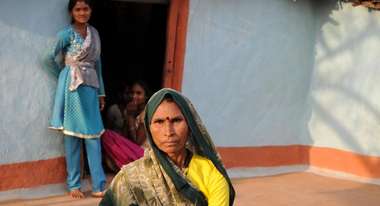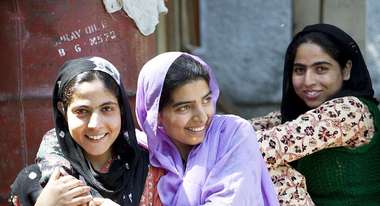Women in India Become Peace Agents
Violent conflicts target many indian women. At the "First Northeast India Women Peace Congregation" they demand to become an active part of the peace movement. "Our hearts are heavy, but our lips are not sealed so let us stand up for our rights."

More than 50,000 lives have been lost to armed conflicts in Northeast India in the last few decades. Women are most of the time the main direct and indirect victims: only in 2013-2014, the National Crime Records Bureau of India noted more than 17,000 cases of violence against women in the region.
I was finally going to the Northeast of India! Traveling to this region had been a wish of mine for a long time – I was fascinated by how different it seemed to be from what is considered “mainland India” and I was looking forward to immersing myself in a new culture. I would visit only Imphal, the capital city of Manipur, but I would have anyway been able to meet and talk to women from the whole of Northeast who were coming to Manipur to attend the ‘First Northeast India Women Peace Congregation’, organized as part of the Welthungerhilfe project “Empowering Women for Peace and Development in South Asia”, co-funded by the European Union. Little did I know I would come back to Delhi with much, much more than some beautiful sarongs and a lot of very colourful pictures…
„We are here, we are many, we are strong“
From our arrival, the team of our local Partner Control Arms Foundation of India (CAFI) was very welcoming and helpful, despite being incredibly busy with the last-minute preparation of the conference. Meeting CAFI staff was my first ‘encounter’ with the reality of the Northeast conflict: two of the female members are pretty much my age (34), maybe younger; one has two kids, the other has three. Unfortunately, they are raising their children alone: they are also ‘conflict survivors’ and belong to the 300 women that are turned into widows every year in Manipur.
This was only one of the heart-breaking stories I heard during the conference. Yet, at the end of the event, I felt full of hope, optimism and enthusiasm as the rest of the women there with me. On that day, 25 March 2015, for the first time in history women from all eight Northeast Indian states (Assam, Manipur, Meghalaya, Mizoram, Nagaland, Tripura, Sikkim and Arunachal Pradesh) came together in Imphal, Manipur, to ‘seek collective peace’. Women from different areas, different ethnic groups and different tribes, wearing different traditional dresses and speaking different languages took the floor and conveyed one message:
"We do not want any more violence! We are here, we are many, we are strong, and we want our voices to be heard: include us in the peace process and we promise we will bring peace!"
Northeast India is a region that deals with complex social-political issues such as struggle over natural resources, ethnic conflicts, illegal migration, displacement and social exclusion. More than a decade after the United Nations Security Council Resolution 1325 (2000) was unanimously adopted, the absence of women in formal peace negotiations is strikingly low. In the Northeast, women groups have developed many powerful programmes of non-violent action, designed to confront the armed violence of both insurgents and the security force, but are still excluded from decision-making structures, and discriminated due to cultural and ethnical reasons, as well as patriarchal structures and customary laws.
„When it’s time to take decisions, women disappear from the table“
The conference was an attempt to change the current trend. The event gathered women leaders as well as conflict survivors across the Northeast to strategize and develop a Regional Action Plan on Women Peace and Security with reference to UNSCR 1325. Being part of it was a unique experience: everywhere I turned, everybody I spoke to, I found an inspiring woman – the room was full of them, and it was over-flowing with courage, persistence and, above all, a pressing desire to change the way things are, to give women what is rightfully theirs and to speed up the peace process.
That women in the Northeast are already taking action became clear from the several examples presented during the event; the issue, however, is the lack of involvement in decision-making processes. “When it’s the moment to rally or demonstrate, then everybody is out looking for us. But when it’s time to take decisions, women disappear from the table, or are put there as mere spectators”, was the enlightening comment of one of the speakers, a „refugee in my own land“, as she describes herself, since she was displaced from her village when she was only 11 years old.
Something that cannot be stopped
“Being here and listening to my sisters makes me speechless,” added a woman leader from Assam “it makes me feel like we are not alone fighting in a corner of India, but we are joined by many other sisters – and brothers – with whom we can jointly work towards peace”. The excitement of all these women coming together for the first time and being able to share their pain and their hopes with other women living in a similar situation in a different state was palpable. There was a general confidence among all of them that by being there all together in this historic day, something had started that cannot be stopped. “It is because of women like you that we believe change can happen in the Northeast, in India and the rest of the world” stated Binalakshmi Nepram, famous peace activist and founder of CAFI, at the end, expressing into words a thought that was going around everybody’s minds.
The discussion at the event culminated in a series of draft recommendations that will be presented to the Indian Government in September 2015, for them to develop a National Action Plan on UNSCR 1325 and Women’s Empowerment in Northeast India.
From one of the women leaders:
"Our hearts are heavy; our lips are not sealed so let us stand up for our rights. We may be the underprivileged but let us unite and use our natural abilities as nurturers, peace makers or harmony seekers and insist that discriminations, conflicts, socio-economic and political insecurity are not acceptable. Let us pledge to promote a world of hope, a legacy of peace, liberty, dignity, good leadership add establish a productive and sustainable economy for ourselves and our children. Long live all the weary mothers of the earth."







